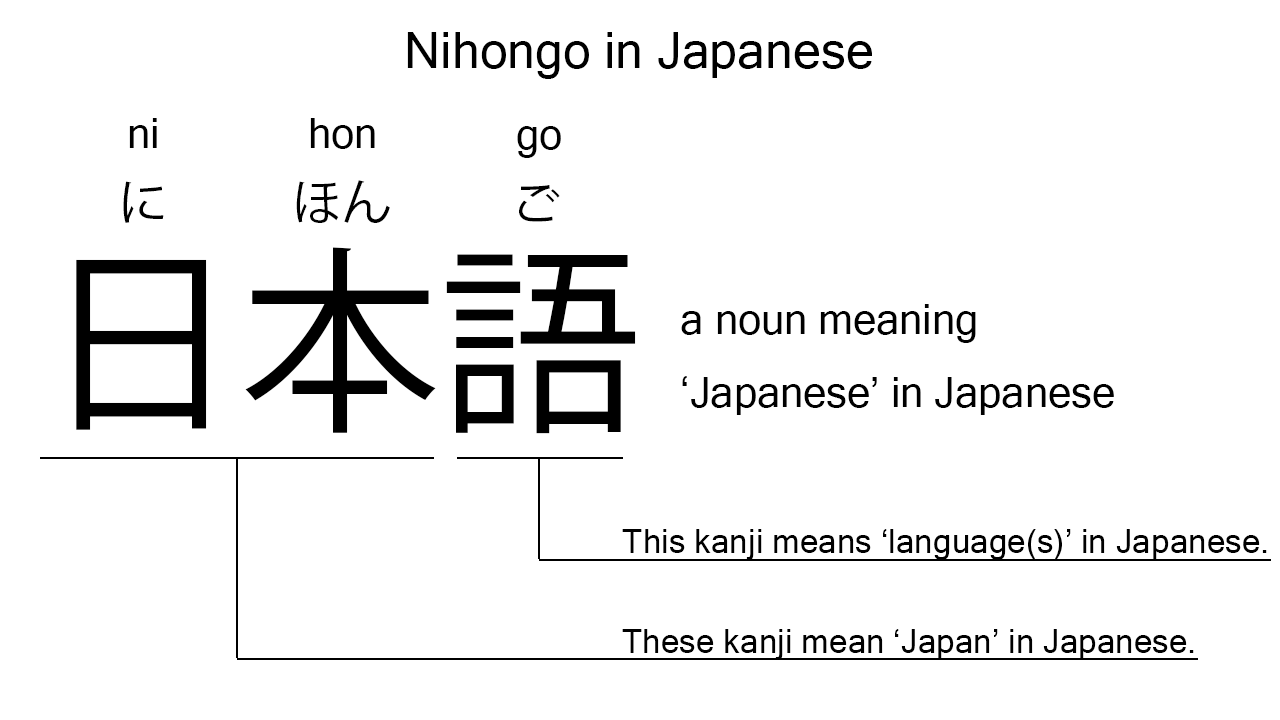What does “nihongo” mean in Japanese?
Native speakers say nihongo to mean ‘Japanese’ or more specifically ‘the Japanese language’ in Japanese. Probably, many Japanese learners know this word as it is often used in Japanese textbooks. In this blog post, however, I will explain this word in detail based on its kanji expression. And also, I will explain how to use it through example sentences. My explanations would help Japanese learners understand nihongo more clearly. Then, let’s get started!
Contents
Definition and meanings of “nihongo”
Let me start with the definition and meanings of nihongo.
- nihongo – 日本語 (にほんご) : a noun meaning ‘Japanese’ or more specifically ‘the Japanese language’ in Japanese.
Japanese native speakers use this noun to refer to the language they are using everyday.
The definition and meanings are simple and clear. To understand this noun more clearly, however, let me explain its kanji expression in detail.
Nihongo in kanji
The kanji expression of nihongo consists of the following two parts:
- nihon – 日本 (にほん) : a noun which means ‘Japan’ in Japanese.
- go – 語 (ご) : a suffix often used to add the meaning of a ‘language’ in Japanese. This can also be found in other words like eigo.
From these two parts, we can understand that nihongo literally means ‘the language in Japan’ in Japanese. This literal interpretation is completely in line with the actual meanings.

When we meet new kanji expressions, we should check their parts in detail to understand their meanings clearly and deeply. In many cases, parts tell us a lot about the meanings of the expressions they form. Actually, here, we could get the better understanding of nihongo through the detailed check above.
So far, I’ve explained the definition and meanings of nihongo together with its kanji expression. Then, let me explain how to use it through the example sentences below.
How to say “Japanese” in Japanese
kanojo wa nihongo ga suki desu – 彼女は日本語が好きです (かのじょはにほんごがすきです)
She loves Japanese.
Below are the new words used in the example sentence.
- kanojo – 彼女 (かのじょ) : a pronoun meaning ‘she’ in Japanese.
- wa – は : a binding particle working as a case marker or topic marker. In the example, this woks after kanojo to make the subject in the sentence.
- ga – が : a case particle used to make the subject word or the object word in a sentence. In the example, this is used after nihongo to make the object in the sentence.
- suki – 好き (すき) : the stem part of the na-adjective, sukina, which means ‘favorite’ in Japanese. Native speakers, however, often use this as an individual word to mean ‘to like’ or ‘to love’ in Japanese. In the example, this is used to mean ‘to love’ in Japanese.
- desu – です : an auxiliary verb used after a noun or adjective to make it polite. Probably, this is well known as a part of Japanese desu form. In the example, this is used after suki to make it sound polite.
This is a typical usage of nihongo. In this example, it works together with the case particle, ga, to become the object in the sentence. When we want to mean ‘Japanese’ or ‘the Japanese language’ in Japanese, anyway, this noun is the best option.
Another example of “nihongo”
boku tachi wa nihongo ga jouzu desu – 僕達は日本語が上手です (ぼくたちはにほんごがじょうずです)
We are good at Japanese.
Below are the new words used in the example sentence.
- boku – 僕 (ぼく) : a pronoun meaning ‘I’ in Japanese. This is used mainly by boys and young males.
- tachi – 達 (たち) : a suffix used after a noun or pronoun to make its plural form. In the example, this is used after boku to make its plural form, boku tachi, which means ‘we’ in Japanese. Learn more about Japanese plural.
- jouzu – 上手 (じょうず) : a noun, but often used as the stem part of the na-adjective, jouzuna, which means ‘good (at something)’ in Japanese.
This is another example of nihongo. In this example, it works as a part of the commonly-used phrase, nihongo ga jouzu, which means ‘to be good at Japanese’ in Japanese. This phrase can work alone especially in speaking to mean ‘my Japanese is good’, ‘your Japanese is good’, or such. It’s worth knowing, I think.
Summary
In this blog post, I’ve explained the definition and meanings of nihongo in detail based on its kanji expression. And also, I’ve explained how to use it through the example sentences. Let me summarize them as follows.
- nihongo – 日本語 (にほんご) : a noun meaning ‘Japanese’ or more specifically ‘the Japanese language’ in Japanese. Japanese native speakers use this noun to refer to the language they are using everyday. Nihon and go mean ‘Japan’ and a ‘language’ respectively, so this noun literally means ‘the language in Japan’ in Japanese. The kanji expression is, therefore, completely in line with the actual meanings.
Hope my explanations are understandable and helpful for Japanese learners.
Leave a Reply